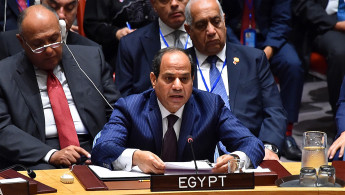Egypt’s president defends military’s economic role
Egypt’s president rejected criticism that the military’s growing economic involvement was distracting it from its core duties.
President Abdel-Fattah Sisi, a former general who led the 2013 military ouster of an elected Islamist president dismissed suggestions of military mismanagement, saying he and the defense minister personally approve all spending.
“There is a ferocious campaign against the state and the armed forces,” Sisi said in his first public comments on the subject.
“This is your army, the army of your country. Your sons. It is not anyone else’s army.”
Sisi said the military’s growing involvement in the economy was a choice, citing a meeting with top military brass in which he asked them to take on the added task of helping him to “rebuild” Egypt.
The military’s economic activities date back to the 1970s, and since then the armed forces have built factories, hotels, bridges and roads. The military also runs gas stations, farms and livestock enterprises.
The military has significantly broadened its economic profile in the three years since the overthrow of President Mohamed Morsi, the country’s first freely elected leader.
Today it supervises massive infrastructure projects and runs a retail network that distributes food at discounted prices.
Egypt’s economy has been battered by unrest since the 2011 uprising that toppled longtime autocrat Hosni Mubarak. Inflation and unemployment are in double digits, and domestic and foreign debts are growing as Egypt’s currency tumbles.
 |
Today the army supervises massive infrastructure projects and runs a retail network that distributes food at discounted prices. |  |
Earlier this month, the military said it would directly import baby formula to counter shortages. The move was ridiculed by many on social media and re-energized a longstanding debate over whether the military is devoting too much attention to its economic ventures at the expense of national security.
Sisi said the military could deploy across the entire country in six hours if needed.
“No one, thanks be to God, can harm the Egyptian state,” he said, raising his voice. “Let no one think that we will abandon it (Egypt) or allow it to be taken away from us … I am responsible before God, you and history to defend it until the very last moment.”
Elsewhere in his 50-minute televised address, Sisi warned that Egypt was under threat by unidentified parties, echoing the country’s conspiracy-obsessed media.
He said “some people” are working to spread rumors or frustration among Egyptians, an activity he likened to terrorism.
“All it takes is for the state to be shaken … and it will then be difficult to regain control,” he said.
Egyptian police over the weekend said they had arrested members of a secret cell belonging to Morsi’s outlawed Muslim Brotherhood whose primary task was spreading pessimism among Egyptians over prospects for economic recovery.
Sisi has in the past suggested unconventional measures to help restore the economy, at one point calling on Egyptians to use their mobile phones to donate small sums to public projects.
On Monday, he said he would like to see a mechanism set up that would allow Egyptians to donate fractions of checks they cash at banks, arguing that this could amount to millions of pounds.
“Please, I want that money!” he said, addressing several hundred officials, Cabinet ministers and army officers who gathered for the inauguration of a housing project in the Mediterranean port city of Alexandria. “How we get our hands on it is what I don’t know.”





 Follow the Middle East's top stories in English at The New Arab on Google News
Follow the Middle East's top stories in English at The New Arab on Google News
![Israeli forces ordered bombed Gaza's Jabalia, ordering residents to leave [Getty]](/sites/default/files/styles/image_330x185/public/2176418030.jpeg?h=a5f2f23a&itok=_YGZaP1z)

